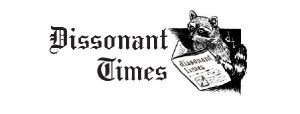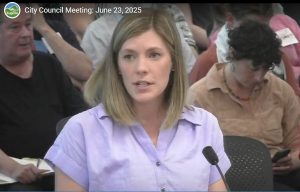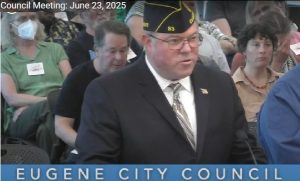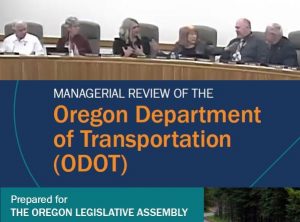10 minutes on DEIB with Da’Mon Merkerson
8 min read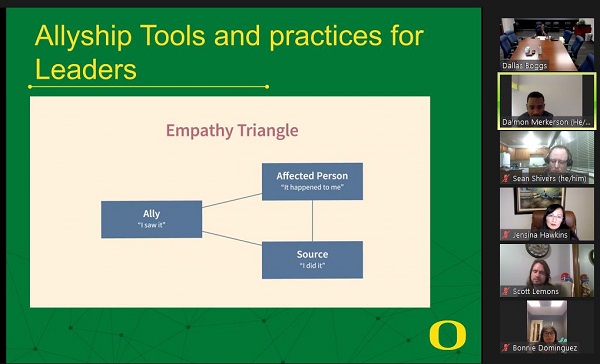
From the Police Commission Feb. 9, 10 minutes on Diversity, Equity, Inclusion, and Belonging with Da’Mon Merkerson.
[00:00:07] Da’Mon Merkerson: Da’Mon Merkerson here, chief diversity officer of the Athletic Department at the University of Oregon.
[00:00:13] I’m the son of a principal. You know, my father was a principal for 20+ years in the state of New Jersey, always made it very clear for me to have a very well-rounded experience as much as possible. He was also a student-athlete when he was in college. It was a very telling experience to get from him, about how to navigate the college athletic space.
[00:00:35] You know, universities are such an interesting microcosm of the greater society, because you have so much different diversity, you know, in its entirety, whether it be where people are from nationally, parts of the globe, parts of the world, race. Generally speaking, it’s a very unique experience.
[00:00:51] And that shaped a lot of my understanding about how I engaged in the world because, a Black student-athlete playing in a sport that was a revenue generator, there was a lot of things that took place for me that always made it seem weird, right?
[00:01:04] And I think the experience, the story that I share, which put me down this path, involves my strength and conditioning coach. Loved him. You know, strength and conditioning coach in the sport of football—you spend a lot of time with him, right? You spend a lot of time with them outside of the position coach or maybe like an academic counselor, you’re with him all the time.
[00:01:21] And it was during one of our winter workouts while we’re training in the off-season, Black History Month was coming upon us, I was a junior and I realized, 90% of our team identified as African-American or Black, and in my three years being there, we had never done anything, any sort of type of acknowledgement within the Athletic Department, about Black History Month.
[00:01:40] So I put on my hat, I’m like, ‘You know what? I’m going to go to the A.D., come up with a PowerPoint slideshow to show throughout the department, right? And we’re going to celebrate Black History Month.’ Little small wins, right?
[00:01:52] So I do this and right before a workout, the strength and conditioning coach comes up, excuse my language, but you know, ‘Why the f*** do I need to learn about Rosa Parks?’ is what he says. Like, ‘Why the f***?’ Like, ‘Why do I need to hear about that? Why do I need to hear this?’
[00:02:06] And I was so taken aback by it, right? Not knowing how to respond to him in that moment. A role model figure for me, right? I like this man. I really like this guy, right? And he’s a white male heterosexual,…and I go to him after like five minutes of absorbing and I go, ‘Well, considering all the players you’re about to train are Black, I think it would be helpful, Coach, if you show some appreciation.’
‘But like, well, how is that going to—? And he just continued to challenge me and essentially what ended up happening is I got thrown out of the weight room (laughing). I got thrown out of the weight room. So that experience has always stayed with me.
[00:02:42] It really shaped how I perceived power and just appreciation and acknowledgement of a culture. So that’s my little story of what set me on this path.
[00:02:54] I’m going to lay out DEIB (Diversity, Equity, Inclusion, and Belonging) in the way that I deal with it. I think there’s many ways to look at it. But I really urge you all to take some thought process about the Belonging piece because the Belonging piece is really where we begin to make cultural acceptance, and then we can move on to justice.
[00:03:14] DEIB work, in a nutshell, is about respect. When we all can have empathy and respect for each other, we can all make strides, but we all have got to understand what respect looks like, for each and every individual.
[00:03:26] As an athletic department, we educate our student athletes about diversity, equity, inclusion, and how we establish belonging so they can advocate and use their own platforms to move towards justice, right?
[00:03:38] Here, we work from an anti-racism perspective, but understand that anti-racism is really a foundational piece, a theoretical framework that can be applied to all the -isms: sexism, ableism, all the things that affect marginalized groups.
[00:03:53] A racist is one who is supporting a racist through their action or inaction and expressing a racist idea. And anti-racist: One who’s supporting an anti-racist policy through their actions or expressing an anti-racist idea. It really brings to the forefront about how are you actually working towards eradicating systems of oppression.
[00:04:14] And it starts with shifting (the) thought process. Because when you look at things from an equal standpoint, right, everything is equal, how we have it written, but it’s not equitable.
[00:04:23] I’ll put it to you this way. If a goal of yours is to increase, let’s say, Black women or women of color in a particular job space, in bringing people to Eugene, Eugene being predominantly white, let’s say from a hair care standpoint, there aren’t a lot of options for women of color.
[00:04:38] So this employee is trying to navigate that space and they’re finding themselves having to go really far out in distance, in order to get their hair done, let’s say the Portland area, right, or go back home. Now they’re having to take time off, in which the other colleagues, because Eugene is predominantly white and caters to that demographic, there’s 40 salons that do that person’s hair.
[00:04:59] A way to be equitable (or figuring out a procedure to help support that staff and retain that staff) is navigating ways to either get more resources for salons, or support them so that they’re able to go without having to worry about going two hours to get their hair done. Now, that’s very specific, but it’s a way of thinking about it from an equitable standpoint.
[00:05:19] Yes, equality wise, everybody has a lunch and time off to go do those things they need to take care of. But because this is something that’s affecting a very unique, marginalized group, it may be an equitable practice to figure out ways to support them in those ways, to bring justice.
[00:05:37] And that’s what we really need to work to achieve. And the best way we as a department here, and I think in most organizations, is really promoting the idea of allyship, right?
[00:05:45] (A): Advocating and amplifying the voices of groups who have been silenced and marginalized. (L): Listening to build trust. (L): Learning to expand your awareness. (Y): Yielding to the group you are trying to help so they can guide you as you help them.
[00:06:00] A big challenge for people who are engaging in allyship is, they just want to jump right into helping. And that is not advised, I would say. You must educate yourself and understand and build relationships with the people you’re trying to work to be allies with, so that you understand how to support them.
[00:06:18] Research shows that when allyship is practiced at an employee level, is where you have the fastest transformational change within your organizations. Policies obviously have to be addressed as well. But when you can get the culture set within your organization, that’s how we build better allyship and eradicate oppression.
[00:06:37] Because we’re not going to drastically change the demographics of Eugene, Oregon. Like, that’s not, I don’t think that’s necessarily the goal. We work to be more diverse because diverse workforces usually lead to more and better output as businesses. But the reason allyship is important, I think even more specifically, for a space like Eugene and the state of Oregon, is, we need people speaking up and having conversations when people of color aren’t present.
[00:07:03] Allyship is important because we need you by understanding, noticing, and speaking out, and speaking up for things, when you’re the only person present. We need someone keeping in mind and speaking for those communities in those spaces.
[00:07:16] And I go to this empathy triangle. This is critical for anyone to train any staff, anybody to talk to.
[00:07:23] All three of these people in these scenarios. (1) I saw it. The ally: I saw it. (2) The affected person: It happened to me. (3) The source: I did it. So I’m going to use the triangle here, the empathy triangle, because it’s important to understand that everybody in this scenario deserves empathy, right?
[00:07:40] First, it’s the ally. The ally, it’s first and foremost reflecting and thinking about: What did I just witness? Am I educated enough to engage with the person on it? And is this the right moment to engage, right? Because you need to take that time for yourself, first and foremost.
[00:07:58] Second, you go to the affected person. You check in with them. And this is where I talked about how people want to be supported and have allyship: ‘I saw something that happened and just made me want to just think and check in with you. I’m not sure if it affected you this way, but, did X, Y and Z happen? Did this (what X, Y, and Z say), did that affect you?’
[00:08:17] And if so, like, ‘How can I support? And if you want to be supported,’ right? Give them the agency because John or whomever may just say, ‘Well, it didn’t affect me that way. I actually didn’t see it that way.’ And the last thing you want to be is triggering for somebody, trigger someone and make them feel a particular way.
[00:08:34] And then the third part, which we don’t think about from an empathetic standpoint, is the person you think committed the act. They deserve empathy too, because honestly, depending on it, they may not have that perspective in this space that they’re doing something a way that could actually hurt a colleague. So that’s what’s lost sometimes in the allyship thought process, is the source.
[00:08:56] So understanding there’s three people: (1) yourself, checking in with (2) the person and (3) the potential source. Here’s how you can go about actually like speaking that to somebody: ‘Hey, I feel uncomfortable. I feel uncomfortable when, so X is the feeling, right, what you got from it, right? And then Y is the time it would’ve happened. And then Z is ‘because.’
[00:09:17] ‘So I feel uncomfortable when you make grand statements about Claude because you know, he’s not here to defend himself, or so on and so forth. So this is like an actual language, and I can train people to have those conversations.
[00:09:31] John Q: That was 10 minutes with Da’Mon Merkerson at the Police Commission Feb. 9. He shared his personal journey, described the difference between equality and equity, asked allies to speak for those not in the room, and encouraged discussions based on the empathy triangle.
